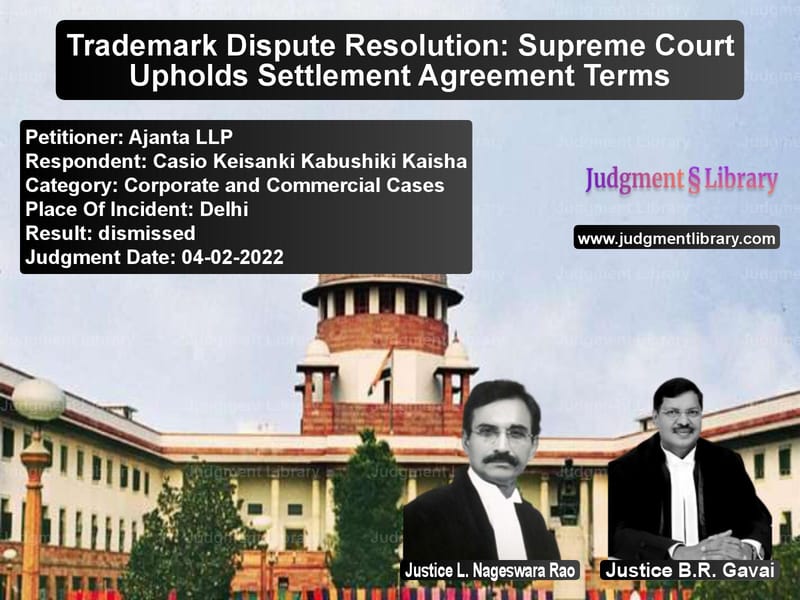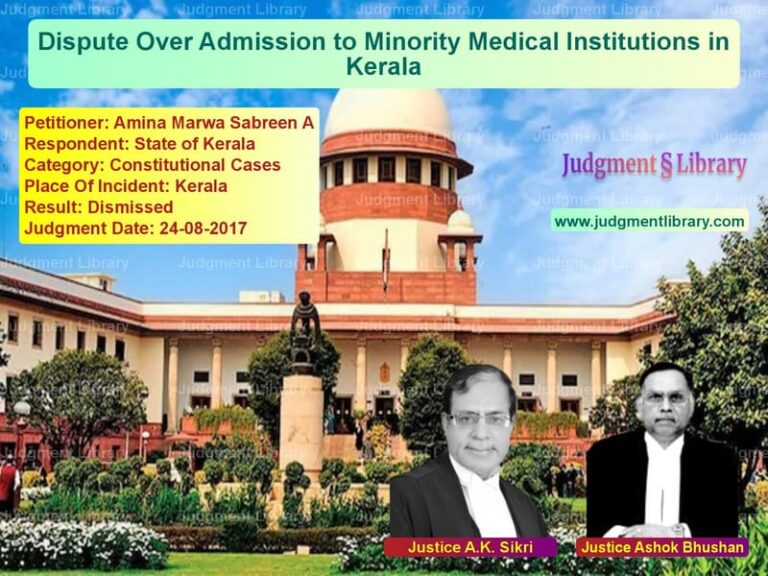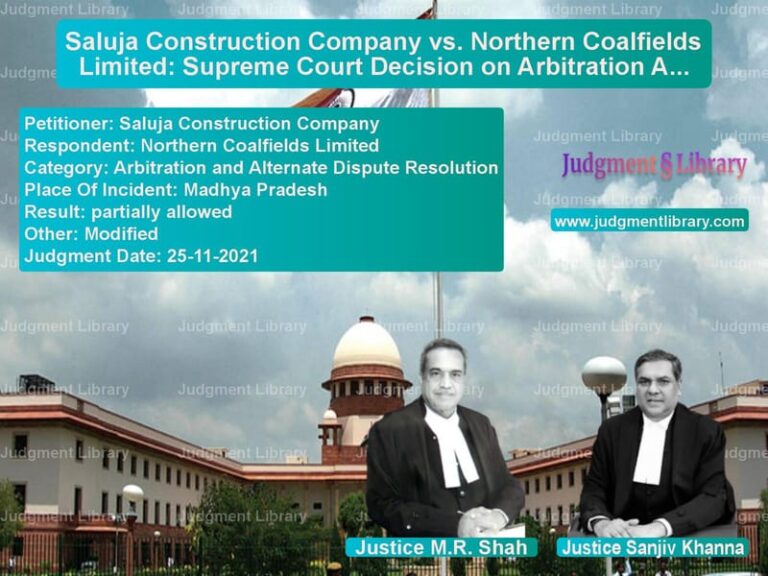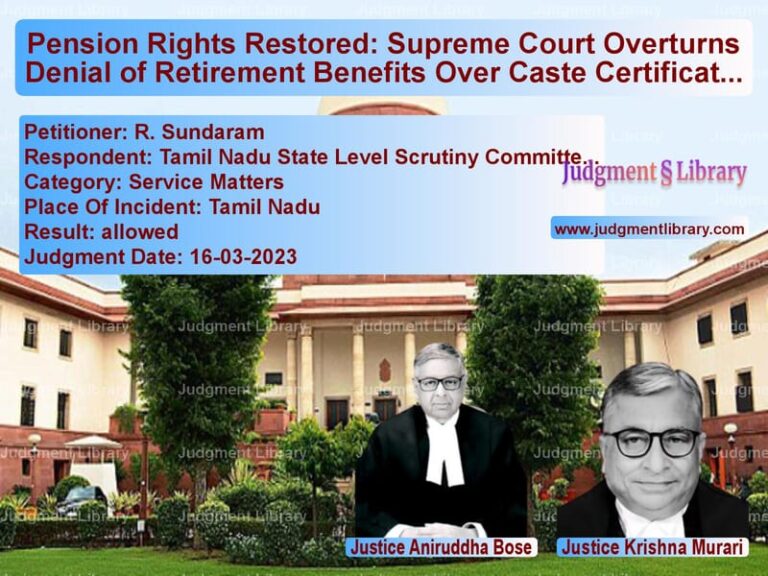Trademark Dispute Resolution: Supreme Court Upholds Settlement Agreement Terms
The Supreme Court, in Ajanta LLP vs. Casio Keisanki Kabushiki Kaisha, delivered a significant judgment on the modification of a consent decree in a trademark infringement dispute. The case revolved around whether a settlement agreement between two parties regarding the use of trademarks and design elements could be modified after a decree was passed.
Background of the Case
The dispute arose when Casio Keisanki Kabushiki Kaisha (Casio) filed a suit against Ajanta LLP for trademark infringement. Casio alleged that Ajanta had copied the design and configuration of its electronic calculator, the ‘FX-991ES PLUS’, leading to consumer confusion. The Delhi High Court issued an interim injunction in favor of Casio, restraining Ajanta from manufacturing or selling the disputed product.
Subsequently, the parties engaged in mediation, leading to a Settlement Agreement on 16 May 2019. The agreement stated that Ajanta would cease using the trademarks ‘FX-991ES PLUS’, ‘FX-991ES’, or any deceptively similar marks. The Delhi High Court decreed the suit based on the settlement terms on 3 July 2019.
Ajanta later filed an application under Sections 152 and 153 read with Section 151 of the Code of Civil Procedure, seeking modification of the consent decree. It claimed that the settlement contained a typographical error that mistakenly included ‘FX’ and ‘991’ as independent terms. The Delhi High Court dismissed the application, leading to the present appeal before the Supreme Court.
Arguments by the Parties
Petitioner’s Arguments (Ajanta LLP)
- The settlement agreement mistakenly included ‘FX’ and ‘991’ separately instead of referring only to ‘FX-991ES PLUS’.
- The error was identified only when Casio sent a legal notice on 26 July 2019, claiming that Ajanta had agreed not to use ‘FX’ or ‘991’ in any form.
- The High Court failed to recognize that misunderstanding is a valid ground for modifying a consent decree.
- Casio’s ‘FX’ mark is a common generic term and cannot be independently trademarked.
Respondent’s Arguments (Casio)
- The settlement agreement was reached after extensive mediation and was approved by both parties before being decreed.
- There was no fraud, misrepresentation, or mistake in the agreement, and Ajanta had the opportunity to review and raise concerns before signing.
- Ajanta’s application was an attempt to alter the terms of a legally binding consent decree, which is impermissible.
- Trademark rights for ‘FX’ had been granted to Casio since 1985, and its design elements were legally protected.
Supreme Court’s Key Observations
1. Modification of Consent Decree
The Court emphasized that consent decrees serve to resolve disputes conclusively and cannot be modified unless fraud, misrepresentation, or a patent mistake is proven:
“A consent decree creates an estoppel by judgment and cannot be modified unless it is vitiated by fraud, misrepresentation, or an obvious mistake.”
2. Scrutiny of Settlement Terms
The Court examined the correspondence between the parties leading to the settlement agreement and found that Ajanta had multiple opportunities to clarify the terms:
“The agreement was reached after extensive discussions and was reviewed by legal experts. The alleged mistake is neither patent nor obvious.”
3. No Basis for Inherent Power to Modify
The Court rejected Ajanta’s claim that the High Court had inherent jurisdiction to correct the decree under Section 151 CPC:
“The inherent power of the court cannot be exercised to amend consent decrees unless fraud or fundamental mistake is established.”
4. Protection of Casio’s Trademark Rights
The Court upheld Casio’s right to prevent Ajanta from using similar trademarks and design elements, affirming the principle of intellectual property protection:
“Trademark rights must be safeguarded, especially when a party has acquired distinctiveness and consumer recognition over time.”
Final Judgment
The Supreme Court ruled as follows:
- The appeal by Ajanta LLP was dismissed.
- The consent decree passed by the Delhi High Court on 3 July 2019 remained unchanged.
- Ajanta was restrained from using ‘FX’, ‘991’, or any similar marks in violation of the settlement agreement.
Impact of the Judgment
This ruling has significant implications for trademark disputes and contract enforcement:
- Enforces settlement agreements: Courts will uphold mediation-based resolutions unless fraud or fundamental errors are evident.
- Protects intellectual property: Companies with legally recognized trademarks can enforce their rights against imitators.
- Limits post-settlement disputes: Parties must be cautious and thorough before agreeing to terms.
- Prevents misuse of court procedures: Inherent jurisdiction cannot be invoked to alter consent decrees without valid grounds.
The Supreme Court’s decision reinforces the principle that consent decrees must be respected and that trademark protections cannot be undermined through retrospective claims of misunderstanding.
Petitioner Name: Ajanta LLP.Respondent Name: Casio Keisanki Kabushiki Kaisha.Judgment By: Justice L. Nageswara Rao, Justice B.R. Gavai.Place Of Incident: Delhi.Judgment Date: 04-02-2022.
Don’t miss out on the full details! Download the complete judgment in PDF format below and gain valuable insights instantly!
Download Judgment: ajanta-llp-vs-casio-keisanki-kabus-supreme-court-of-india-judgment-dated-04-02-2022.pdf
Directly Download Judgment: Directly download this Judgment
See all petitions in Corporate Compliance
See all petitions in unfair trade practices
See all petitions in Judgment by L. Nageswara Rao
See all petitions in Judgment by B R Gavai
See all petitions in dismissed
See all petitions in supreme court of India judgments February 2022
See all petitions in 2022 judgments
See all posts in Corporate and Commercial Cases Category
See all allowed petitions in Corporate and Commercial Cases Category
See all Dismissed petitions in Corporate and Commercial Cases Category
See all partially allowed petitions in Corporate and Commercial Cases Category







